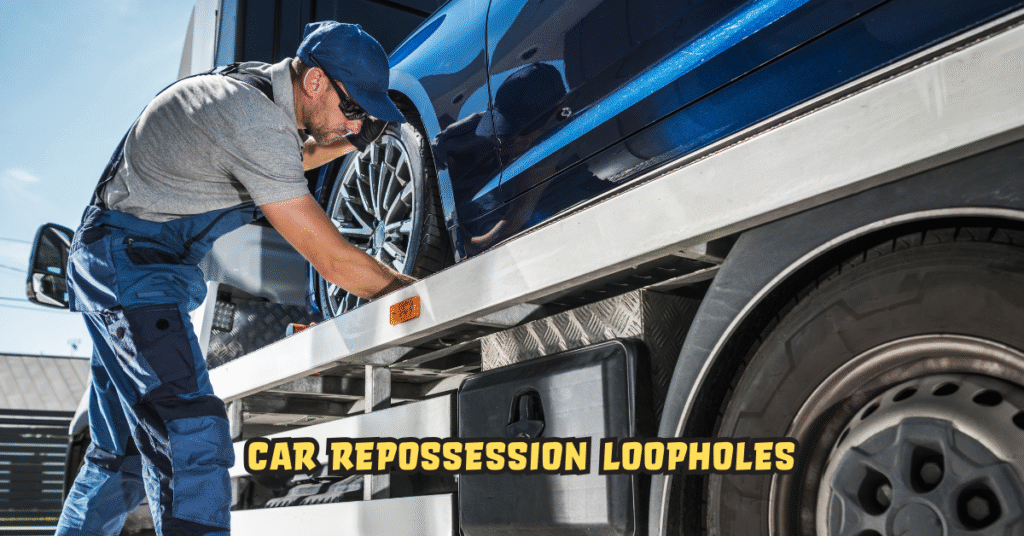Car repossession is a financial and legal process that can feel both overwhelming and intimidating for borrowers. At its core, repossession occurs when a lender reclaims a vehicle after missed payments under the terms of a loan or lease. Yet, within the rigid framework of repossession law, there exist notable exceptions, protections, and what many borrowers describe as “loopholes.” These are not shortcuts to evade responsibility entirely but rather legal and procedural safeguards that, if understood correctly, can make the difference between losing a car and regaining control of one’s financial stability.
For consumers navigating difficult economic times, repossession often represents more than losing transportation; it symbolizes a potential unraveling of daily life. Cars are not merely vehicles—they are lifelines to jobs, schools, and essential errands. That is why understanding repossession loopholes matters. These loopholes are not tricks or hidden hacks; instead, they reflect the limits of what lenders can do and the rights borrowers maintain, even under financial strain.
This guide explores the mechanics of car repossession, examines where lenders’ powers stop, and highlights ways borrowers can protect themselves. It covers state laws, lender responsibilities, borrower rights, and potential strategies to navigate or delay repossession. As one financial advisor put it, “The law is not designed to punish borrowers but to balance the lender’s right to payment with the borrower’s right to fairness.”
What is Car Repossession?
Car repossession occurs when a lender reclaims a vehicle due to a borrower’s failure to meet contractual loan obligations. Most auto loans grant lenders a “security interest” in the vehicle, meaning the car serves as collateral. When payments stop, the lender can legally seize the car, often without prior notice, depending on state law.
Repossession is a powerful tool for lenders, but it is not limitless. The act must comply with consumer protection laws, avoid breaches of peace, and respect the borrower’s remaining rights. Understanding these limits provides borrowers with insight into what lenders can—and cannot—do.
Borrower Rights During Repossession
Borrowers often assume they lose all rights once they default, but this is not the case. Legal frameworks protect consumers from unfair practices. For example, lenders cannot break into a locked garage to seize a car, nor can they threaten or assault borrowers during repossession.
In addition, many states require lenders to provide notice of the sale after repossession, giving borrowers a chance to redeem the car or at least monitor whether it is sold fairly. These rights are sometimes mistaken for loopholes, but in reality, they form the legal backbone of consumer protection.
Common Car Repossession Loopholes Explained
When people speak of car repossession loopholes, they are usually referring to strategies that take advantage of legal protections, lender missteps, or procedural requirements. These loopholes can delay repossession, reduce financial liability, or sometimes help borrowers recover their cars.
Examples of Loopholes:
- Lender Must Follow State Law: If a lender fails to comply with local repossession laws, the repossession may be deemed unlawful.
- Breach of Peace: If a repossession agent uses force, threats, or enters private property unlawfully, the repossession can be contested.
- Improper Sale Procedures: After repossession, lenders must sell the car in a commercially reasonable manner. Failure to do so can reduce borrower liability.
- Bankruptcy Filing: Filing for bankruptcy often halts repossession through an “automatic stay,” giving borrowers time to restructure finances.
Table 1: Examples of Borrower Protections Often Mistaken for Loopholes
| Protection Type | Description | Borrower Advantage |
|---|---|---|
| Breach of Peace Rule | Lenders cannot use force or break into locked property | Grounds to challenge repossession |
| State-Specific Notices | Some states require pre- or post-repossession notices | Provides time to act or redeem |
| Bankruptcy Automatic Stay | Filing halts repossession immediately | Gives borrower legal breathing room |
| Commercially Reasonable Sale | Cars must be sold fairly after repossession | Reduces borrower liability if violated |
State-by-State Differences in Repossession
Repossession laws vary significantly from one state to another, creating what appear to be “loopholes” depending on jurisdiction. For example, some states allow repossession without notice, while others require lenders to issue a right-to-cure notice, giving borrowers a chance to catch up on missed payments before repossession begins.
States also differ in how they regulate deficiency balances—the amount still owed after the repossessed car is sold. In some states, if the lender fails to notify the borrower of the sale, they cannot pursue a deficiency judgment.
Understanding these nuances is essential for borrowers. What might be permissible in Texas could be unlawful in Massachusetts. Borrowers who familiarize themselves with state laws often discover protections they didn’t realize existed.
Table 2: Examples of State-Level Variations
| State | Notice Requirement | Redemption Rights | Deficiency Balance Rules |
|---|---|---|---|
| California | Post-repossession notice required | 15-day redemption period | Deficiency allowed if sale is lawful |
| Texas | No prior notice required | Redemption possible until sale | Deficiency allowed if notice sent |
| Massachusetts | Notice before repossession | 20-day cure period | Strict limits on deficiency judgments |
| Florida | Post-repossession notice required | 10-day redemption period | Deficiency allowed with fair sale |
Bankruptcy as a Loophole
One of the most significant tools borrowers use to prevent repossession is bankruptcy. Filing for Chapter 7 or Chapter 13 triggers an “automatic stay,” which legally halts most collection efforts, including repossession. This pause can provide critical time to restructure payments, negotiate with lenders, or even discharge certain debts.
However, bankruptcy is not without consequences. It impacts credit scores severely and remains on records for years. Still, for many borrowers facing imminent repossession, it serves as a powerful protective measure.
Repossession Loopholes and Lender Errors
Repossession agents must follow precise legal procedures. If lenders or agents fail in this duty, borrowers may have grounds to challenge the repossession. Common errors include:
- Failing to send proper notices
- Selling the car below fair market value
- Harassing the borrower or family members
- Ignoring redemption rights
These mistakes do not erase the borrower’s debt but can shift legal outcomes. In some cases, courts may dismiss deficiency claims or even award damages to borrowers.
Borrower Strategies to Delay or Avoid Repossession
While repossession cannot always be avoided, borrowers can employ strategies to delay or minimize its impact.
- Communicate with Lenders: Many lenders prefer restructuring loans to repossessing vehicles.
- Seek Loan Modifications: Extending payment terms can reduce monthly obligations.
- Hide the Vehicle Temporarily: Although controversial and often only a short-term tactic, hiding the car on private property can delay repossession until legal notice requirements are fulfilled.
- File Bankruptcy: As discussed, this is a legal tool that halts repossession immediately.
Each strategy has risks and limitations, but they demonstrate that borrowers are not entirely powerless.
The Role of Consumer Protection Agencies
Government and nonprofit organizations play a critical role in educating borrowers about their rights. Agencies such as the Federal Trade Commission (FTC) issue guidelines for lenders, while local legal aid offices assist borrowers facing repossession.
By accessing these resources, borrowers often discover protections that function as effective loopholes. For example, some states prohibit repossession once a borrower has made a significant percentage of payments, shifting power back to the consumer.
Long-Term Impact of Repossession
Even if loopholes are successfully used, repossession often has long-term consequences. A repossession can remain on credit reports for up to seven years, affecting future borrowing opportunities. It may also influence insurance premiums, as some insurers view repossession as a marker of financial instability.
Thus, while loopholes may offer temporary relief, long-term financial planning is essential. Borrowers must weigh the immediate advantage of delaying repossession against the lasting impact on financial health.
Conclusion
Car repossession loopholes are less about tricking the system and more about understanding and exercising rights within the legal framework. Borrowers facing repossession should recognize that lenders have power but not unchecked authority. By leveraging state-specific protections, challenging lender errors, or even filing for bankruptcy, individuals can regain some control during financially uncertain times.
Ultimately, repossession is not only a legal process but a deeply personal one. It impacts families, work, and mobility. Yet within this challenge lies opportunity—opportunity to assert rights, negotiate, and protect one’s financial future. As one borrower who successfully redeemed her car explained, “Repossession felt like the end, but knowing my rights gave me a way forward.”
FAQs
1. What is the most effective car repossession loophole?
The most effective legal tool is often bankruptcy, as it immediately halts repossession through an automatic stay.
2. Can lenders repossess a car without notice?
Yes, in many states lenders can repossess without prior notice, though they must follow post-repossession procedures.
3. What happens if a lender violates repossession laws?
If lenders breach peace or fail to follow state laws, repossession can be challenged and borrowers may recover damages.
4. Can hiding a car prevent repossession permanently?
No, hiding a car may delay repossession, but it is not a permanent solution and can escalate legal consequences.
5. Does repossession erase my debt?
No, even after repossession, borrowers may still owe a deficiency balance if the car sells for less than the loan amount.







